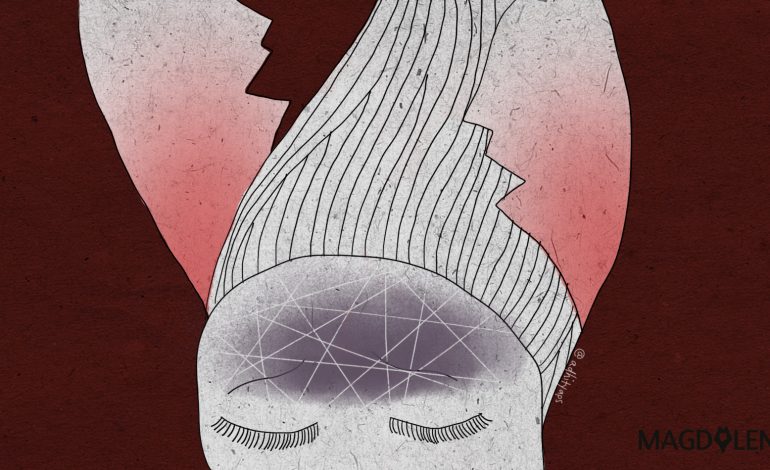We Should All be a Minority, At Least Temporarily

While being a Sundanese Muslim woman is not the same as being a Javanese Muslim man in Indonesia, it’s similar. It is similar in a way that I didn’t have to worry about fitting in when I entered public schools, about practicing my religion in peace, or about running for office in the future. I was part of the majority, and, frankly, I had taken it for granted.
In the past four months, however, I’ve been forced to learn that in the United States, being an Indonesian Muslim woman is multiple levels below a white American man in the social pyramid. Now I worry about fitting in at graduate school, about where I could celebrate Eid al-Fitr next year, and about whether something would happen to my student visa. I am part of the minority now, and it feels uncomfortable.
The most profound change began in my classrooms. Sitting with over 50 extremely well read, effortlessly critical public policy students almost every day, I could not help but develop a certain awareness about my identity and make sense of what it means, an extra effort that did not seem necessary when almost everyone looked like me and shared my religion back home. Simply being here has waked me up from my quarter-century-long “identity numbness” and made me realize that while I’m not the only international student, I’m the only Indonesian Muslim woman in my cohort.
In the beginning, it was quite refreshing. But not for so long.
Now whenever I raise my hand to share my perspectives in class discussions, I sense a new burden of representing the country on my shoulders. One time the professor asked for an “Indonesian perspective” regarding an ethical case, and I had to explain that “an Indonesian perspective” is by no means singular. There are over 250 million people in Indonesia, speaking over 300 languages and practicing more than five religions. Now sharing a perspective has to include a contextual background: explanation about the culture I was raised in, or clarification about how my liberal opinions may differ from the majority of Indonesian – and the fact that I don’t always represent them.
Being a minority is being different. Being a minority, it turns out, puts my identity under a spotlight in almost everything that I do, lurking behind every statement and academic argument that I offer. Now my classmates would think of me whenever they see anything – a news article, an event, a speaker, a book, a film – related to Indonesia. My personal attributes seem to fade into the background, and to most of the people I know, I’m simply “that Indonesian girl with short hair.”
Outside the classrooms, I had been mistakenly assumed as Chinese (maybe because I look oriental), which made me realize how small and little known my country is. I explained to him that Indonesia is the fourth most populous country after the U.S. and that we are an archipelago in South East Asia. He seemed surprised that he never heard about it. Just several days before the US Election I had also been told to “go home” by a white American man on the streets. I was too afraid to reply to him and, instead, just picked up my speed. Although I look different from the majority Americans, I believe that I have put just as much hard work to be able to study here in the U.S., and my identity should not matter more than when it’s relevant.
But when I revisit Indonesia through online media, I realize now that we Indonesians have not demonstrated our best in treating our minority either. Last month, a Christian religious ritual was interrupted by an Islamic group because they were using a “public facility” in Bandung. In Bogor, the permit for a new church has not been granted and the Christian congregation had to pray in secret for years. In Papua, human rights violation continues to take place. In Jakarta, the Christian, ethnic Chinese governor of Jakarta, Basuki Tjahaja Purnama, recently sat in the courtroom, facing a blasphemy charge for remarking that politicians had used the Islamic scripture to their advantage.
Being a minority in the US, though not directly comparable, made me wonder if this is how my ethnic Chinese Indonesian friends feel. If I – a foreign student here – could feel discomfort by how my identity overly defines what I’m supposed to say and do, what about people who were born and who grew up exclusively on Indonesian soil? What about people who identify themselves as Indonesians, and are still be treated differently? Is it possible that our blind spot as a majority has added micro (in some cases, macro) aggressions against a certain racial group, as in the case of those on the side of 11/4 and 12/2 rallies?
My newly developed self-consciousness about my identity, values, and ideologies makes me aware of what the others go through. Having understood how innocent comments could still create offense or discomfort, I try to make sure that my statements and gestures do not disregard or discriminate against the minorities in any way. This process creates an entire layer of thinking on top of the actual thinking, and this has been a novel, challenging, yet rewarding experience. I only fully understand the challenges of being a minority after I became one myself.
Given how far away we are from each other, separated by seas and cultural differences, Bhinneka Tunggal Ika (unity in diversity) sounds like an empty slogan. Is it impossible for Indonesia to grow organic tolerance because we are a vastly Muslim-majority country? How can we encourage cross-cultural, cross-religious dynamics within the country more? Is the only way to foster genuine tolerance toward diversity in Indonesia involves a program where individuals are relocated to a population where they would be a minority? Or could our education system do it?
While I will continue to wonder, I am determined to never forget how being an Indonesian Muslim woman in this country has made me feel, even after I fly back home and resume my spot in the majority.
Andhyta Firselly Utami (@Afutami) is currently a public policy student at Harvard Kennedy School. In her previous lives, she was a researcher, a deadliner, a heartkeeper, a grammar snob, a nerd, a friend, a bad driver, a fact-checker, a fast reader, and a perfectionist. But above all, she’d like to think that she’s a writer.






















